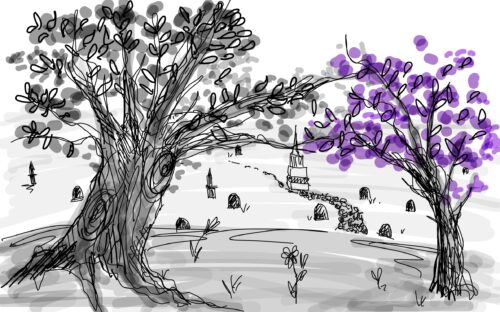Months after starting to write for the Independent last spring, I learned from my mother that my father had once written for the publication. Searching for his work among the yellowed pages of the Independent’s archives, I found his article from 1979: “Take a Walk on the Wild Side,” a plea to his fellow students at Harvard to set aside their classwork and walk amongst some of the places of tranquility within reach—Mount Auburn Cemetery in Cambridge, Concord, Massachusetts, and the tip of the Cape. A number of years, places, and people have passed since 1979, among them my father, who died and was buried in my hometown in New Jersey nearly eleven years ago.
When I first read my father’s directive asking his classmates to “get out and saunter,” I had never been to Mount Auburn Cemetery. In truth, by the time I first visited it this summer, six months after reading his words, I had forgotten that he had even written about it. Since my father’s death, cemeteries have felt like a special place—a realm to connect with one of the least talked-about but most thought-of aspects of my life. Cemeteries put me on a level playing field with my friends who grew up with two parents; memories flood in of a dinner table with every seat full. I have always subscribed to the belief that the reverberations of loved ones do not leave with their deaths, but in these places, I am aware that I am not alone. Cemeteries put me at ease. I worry not about playing the “strong man” at a cemetery, having cried many times while visiting my father’s grave.
The first time I visited Mount Auburn this past summer, sweltering heat made the walk up and down its many hills feel eternal. I passed the graves of many great intellectuals and famous politicians of American history, including Julia Ward Howe, Mary Baker Eddy, and Henry Cabot Lodge. The beauty of the carefully crafted gardens, created in part by the Massachusetts Horticultural Society, lent grace to the sadness that hung in the air of death.
Though entering with a group of friends, I unknowingly took the advice of my father to “find an empty nook and relax,” a venture with infinite permutations within the sprawling field. In one such grove blocked off by tall trees on three sides, I encountered a friend with whom I had disconnected over the previous few months. An inevitable point of conversation, the death of our respective parents brought us together, as it did when we first met. In recovering a friend I thought I had lost, I found joy in the type of place that can also bring me tremendous sorrow.
In much the same way, attending Harvard is a sentimental experience for me. I remember driving up to the 25th reunion of my parents’ graduation from Harvard Law School, the place where they met and fell in love. I spent one afternoon walking the streets surrounding Harvard College, the school my father attended after the premature death of his own father. Walking down the same streets over a dozen years later, I cannot help but think of Harvard as one of the last tangible connections between me and my father, a man who I looked up to and loved more than anything.
The second time I visited Mount Auburn, I came alone. The gravesite of the political philosopher Robert Nozick, whose work I studied in a political theory class, piqued my curiosity. Seeing Nozick’s tombstone, marked as a “university professor,” took me back to my father’s own time at Harvard, perhaps at the peak of Nozick’s prominence within the academic world. In a cemetery that was not where he lies, at the grave of a professor that he probably never even knew, I felt close to my father. After a decade of sharing very little, we could share this cemetery: a connection to a larger-than-life man in this fortress of solitude within bustling Boston.
Over the past few months, I’ve recommended walking around Mount Auburn Cemetery to dozens of friends for its beauty alone. Perhaps more importantly, though, you’ll also be able to find tranquility, a rare achievement in the perpetually active lifestyle of Harvard students and the undying buzz of Cambridge. A walk in solitude has a spiritual effect, removing a veil of ambition that obscures perspectives and values. “Get out and saunter,” and you might just find that it gave you what you needed.

